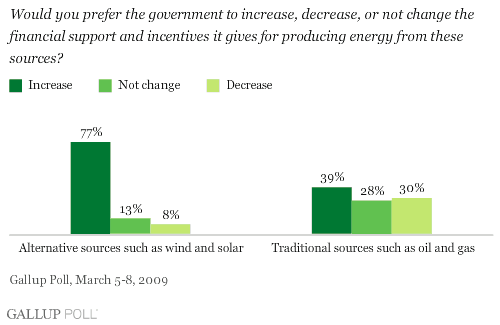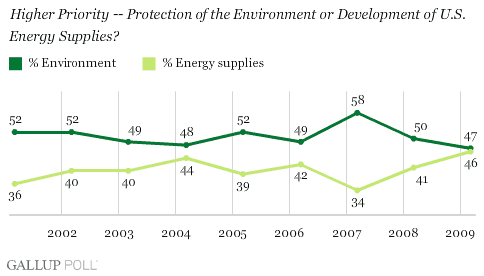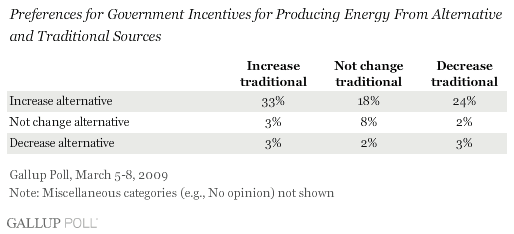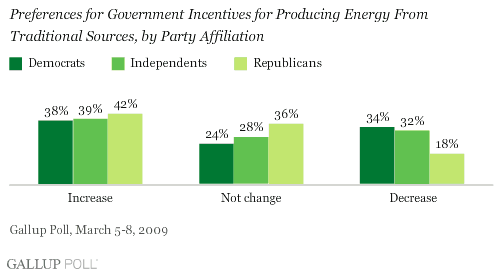PRINCETON, NJ -- Americans endorse increased government efforts to encourage energy production from alternative sources of energy, but at the same time do not believe the government should reduce its financial support for the production of energy from traditional sources. Only 30% think the government should decrease the monetary support and incentives it provides to producers of energy from oil and gas.

These findings are based on Gallup's annual Environment Survey, conducted March 5-8.
The Obama administration has prioritized investment in renewable energy, and a significant proportion of the recently passed economic stimulus bill is aimed at doing that. The administration also promises to cut carbon emissions and sees the use of clean-energy sources such as wind, solar, and nuclear as key to achieving that goal. Additionally, the administration has indicated it would reduce subsidies and add excise taxes on production of oil and gas in areas like the Gulf of Mexico.
More than three-quarters of Americans say they support increased government financial support and incentives to produce energy from alternative sources, while just 8% say the government should do less in this regard and 13% say it should continue what it is doing.
And while Americans are far less likely to favor increased government aid to produce energy from traditional sources -- only 39% hold this view -- another 28% want these efforts maintained. Thus, two in three Americans think government should continue to support energy production from oil and gas at either current or heightened levels. Just 30% call for a reduction in these efforts.
It appears the public clearly recognizes the need to develop alternative energy sources and the benefits of doing so, but may also think it is too soon to do away with the current way of doing things. In general, Americans are concerned about the energy situation -- 42% describe it as "very serious," which is down slightly from last year's 46%, but at the higher end of what Gallup has measured in the last decade. Also, Americans are somewhat more willing to live with environmental degradation in the pursuit of energy sources than they have been in the past -- 47% say the government should put a greater emphasis on environmental protection over energy exploration versus 46% who say the development of energy supplies should be the greater priority. This parity is a departure from the past, as Americans have typically come down on the side of environmental protection by a significant margin in prior Gallup Polls.

Alternative and Traditional Energy Preferences
Combining respondents' answers to the traditional and alternative energy-policy questions provides a better sense of what Americans would ideally like to see done. This analysis shows that the greatest number of Americans (33%) favor increasing government support or incentives to produce energy from both sources. Eighteen percent favor increased efforts to encourage alternative energy production while not changing current government efforts aimed at traditional energy production.

All told, 62% of Americans say they favor increased government assistance for development from both types of energy sources (33%), increased efforts on one while efforts on the other are maintained (21% -- mostly those who want to see alternative energy efforts expanded), or maintaining current government activity on both (8%).
About one in four Americans think the government should increase its support for alternative energy but decrease support for traditional energy. Three percent think the government should cut back its financial assistance in both areas.
Preferences for Government Energy Initiatives by Subgroup
Given the broad public support for increased government efforts to encourage the development of alternative energy, it follows that most subgroups of the population generally support this approach. This includes majorities of Democrats (86%), independents (79%), and Republicans (63%), though Republicans are clearly the least supportive of the three party groups.
Republicans, Democrats, and independents are about equally likely to favor increased government efforts aimed at producing energy from traditional sources, with roughly 4 in 10 in each group choosing this option. But Republicans are more likely to favor keeping efforts at the current level, and Democrats are more likely to favor a reduction in efforts.

Implications
Americans largely endorse government efforts to increase alternative energy production through the use of financial support or incentives, directly in line with the Obama administration's stated objectives. And though Americans are not as enthusiastic about increasing the government's support for traditional energy production, they also don't want to see a reduction in government support of those efforts.
It is unclear whether the poor state of the economy has made Americans less willing to do away with traditional energy approaches, but Gallup has found over the years that sentiments in favor of environmental protection wax and wane in response to the health of the economy.
Survey Methods
Results are based on telephone interviews with 1,012 national adults, aged 18 and older, conducted March 5-8, 2009. For results based on the total sample of national adults, one can say with 95% confidence that the maximum margin of sampling error is ±3 percentage points.
Interviews are conducted with respondents on land-line telephones (for respondents with a land-line telephone) and cellular phones (for respondents who are cell-phone only).
In addition to sampling error, question wording and practical difficulties in conducting surveys can introduce error or bias into the findings of public opinion polls.
